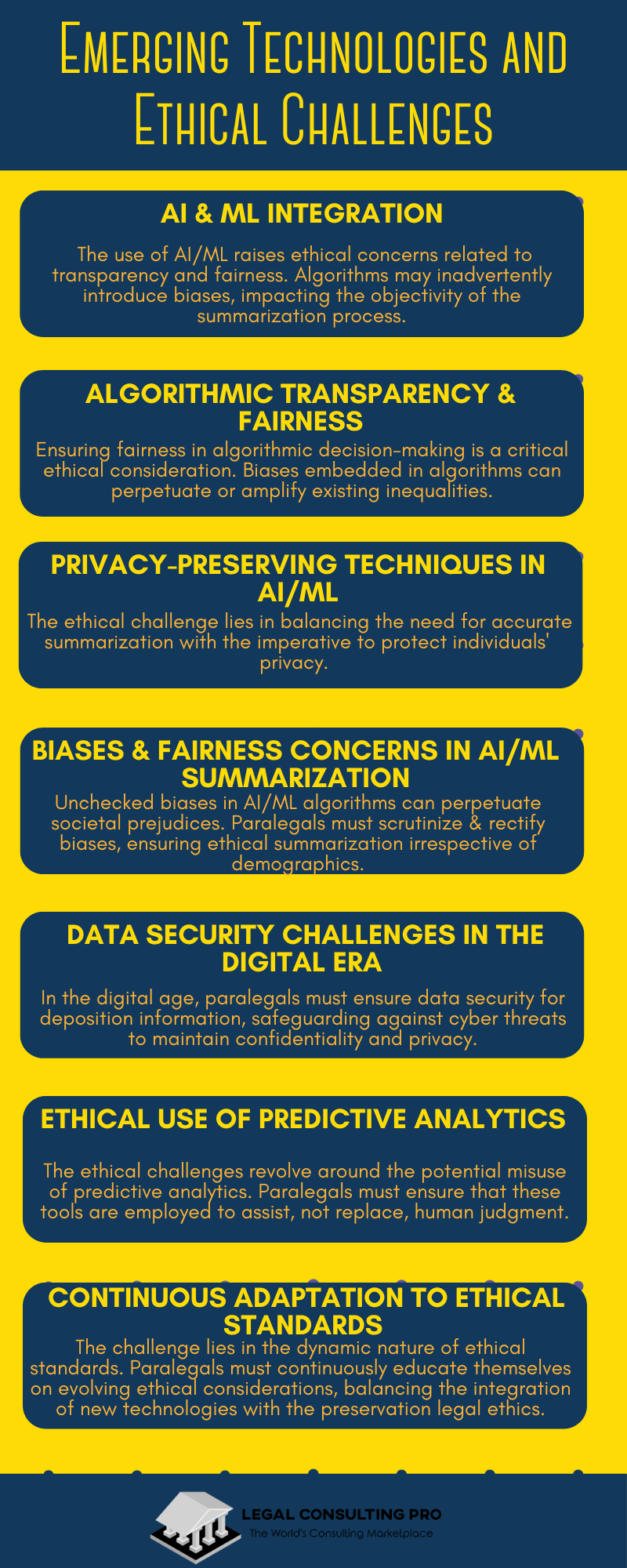Introduction
Deposition summarization is a crucial step in legal proceedings, enabling legal professionals to distill complex testimonies into concise summaries. However, in the pursuit of effective summarization, ethical considerations surrounding confidentiality and privacy must be at the forefront. This article delves into the ethical nuances of deposition summaries, with a primary focus on safeguarding confidential information and upholding privacy rights within the realm of paralegals.
Understanding the Crucial Role of Deposition Summarization
Before delving into ethical considerations, it’s essential to grasp the pivotal role of deposition summarization. Often entrusted to paralegals, this process involves condensing extensive witness testimonies into coherent summaries. These summaries serve as strategic tools for legal professionals, aiding in the presentation of essential information during trials.
The Central Role of Paralegal Services and Ethical Responsibilities
Paralegals, as integral members of the legal team, play a central role in deposition summaries. Beyond their responsibilities in compilation, paralegals shoulder the ethical duty to ensure confidentiality, protect privacy rights, and maintain the accuracy of information. Let’s explore the ethical considerations surrounding confidentiality and privacy within the realm of paralegal services.
Confidentiality in Deposition Summarization
-
Understanding the Duty of Confidentiality in Paralegal Services
At the core of ethical considerations in deposition summarization lies the duty of confidentiality. Paralegals, as custodians of sensitive information extracted from witness testimonies, are obligated to safeguard this information diligently. The confidentiality of data is integral not only to uphold the integrity of the legal process but also to foster trust in the services provided by paralegals.
-
Managing Access to Confidential Information
Vigilance in managing access to deposition information is critical for paralegals. Restricting access solely to individuals directly involved in the case is paramount to prevent unauthorized disclosure. This practice not only safeguards the privacy of individuals but also ensures that sensitive details are shared only with those who have a legitimate need for the information.
-
Securing Storage and Transmission
Maintaining confidentiality extends to the storage and transmission of deposition summaries. Paralegals must ensure that both electronic and physical copies are securely stored, with access restricted to authorized personnel. When transmitting summaries, the use of secure channels and encryption provides an extra layer of protection against unintended disclosures.
Privacy Considerations in Deposition Summaries
Balancing Transparency and Privacy Rights in Paralegal Services
While transparency is a foundational principle in legal proceedings, paralegals must strike a delicate balance between providing sufficient information for the legal team’s understanding and respecting the privacy rights of individuals. Achieving this balance ensures that the summary discloses only what is necessary for the legal strategy without infringing on personal privacy.
Redaction and Anonymization Techniques in Paralegal Services
To protect privacy, paralegals employ redaction and anonymization techniques when crafting deposition summaries. Personally identifiable information (PII) should be redacted or anonymized, ensuring that the identities of individuals involved are shielded. This meticulous approach is crucial in preventing unwarranted intrusions into the private lives of those connected to the case.
Cultural Sensitivity and Handling Sensitive Topics
Depositions may involve discussions around sensitive topics or cultural nuances that require heightened awareness. Paralegals must approach such situations with cultural sensitivity, ensuring that the summary neither perpetuates stereotypes nor compromises the dignity and privacy of the individuals involved.
Emerging Technologies and Ethical Challenges in Deposition Summarization
Advancements in technology have revolutionized various industries, and the legal sector is no exception. In the context of deposition summarization, the integration of emerging technologies presents both opportunities and ethical challenges. This article explores the impact of cutting-edge technologies on deposition summarization processes, shedding light on the ethical considerations that legal professionals, especially paralegals, must navigate.
1. Artificial Intelligence (AI) and Machine Learning (ML) Integration
Opportunities: AI and ML technologies offer the promise of increased efficiency and accuracy in deposition summarization. These systems can rapidly analyze vast amounts of data, identify patterns, and generate concise summaries, potentially saving time and resources for legal professionals.
Ethical Challenges: The use of AI/ML raises ethical concerns related to transparency and fairness. Algorithms may inadvertently introduce biases, impacting the objectivity of the summarization process. Paralegals must address these biases to ensure equitable outcomes and prevent any form of discrimination.
2. Algorithmic Transparency and Fairness
Opportunities: Algorithmic transparency ensures that the decision-making process in deposition summarization is understandable and explainable. Transparent algorithms build trust among legal professionals and stakeholders, providing insights into how conclusions are reached.
Ethical Challenges: Ensuring fairness in algorithmic decision-making is a critical ethical consideration. Biases embedded in algorithms can perpetuate or amplify existing inequalities. Paralegals must strive for fairness by identifying and mitigating biases and maintaining a commitment to justice and impartiality.
3. Privacy-Preserving Techniques in AI/ML
Opportunities: Privacy-preserving techniques, such as encryption and federated learning, enable the secure handling of sensitive information during deposition summarization. These techniques allow the utilization of AI/ML without compromising the privacy of individuals involved in legal proceedings.
Ethical Challenges: The ethical challenge lies in balancing the need for accurate summarization with the imperative to protect individuals’ privacy. Paralegals must adopt and oversee privacy-preserving techniques to prevent unauthorized access to personal information and maintain confidentiality.
4. Biases and Fairness Concerns in AI/ML Summarization
Opportunities: Addressing biases in AI/ML algorithms enhances the fairness of deposition summarization. Paralegals can contribute to the development and deployment of algorithms that recognize and rectify biases, promoting an equitable legal system.
Ethical Challenges: Unchecked biases in AI/ML algorithms can perpetuate societal prejudices and systemic disparities. Paralegals must scrutinize algorithms for fairness, rectify biases, and ensure that the summarization process upholds ethical standards, irrespective of demographic factors.
5. Data Security Challenges in the Digital Era
Opportunities: Digital platforms provide convenience and accessibility in deposition summarization. Secure cloud-based solutions and encrypted communication channels can enhance data security, protecting deposition content from unauthorized access.
Ethical Challenges: The digital era introduces ethical challenges related to data security. Paralegals must be vigilant in safeguarding deposition information from cyber threats, ensuring that the digital transition does not compromise the confidentiality and privacy of sensitive data.
6. Ethical Use of Predictive Analytics
Opportunities: Predictive analytics can assist legal professionals in anticipating case trajectories and making informed decisions. Ethical use involves leveraging these tools responsibly, enhancing the overall effectiveness of deposition summarization.
Ethical Challenges: The ethical challenges revolve around the potential misuse of predictive analytics. Paralegals must ensure that these tools are employed to assist, not replace, human judgment. Overreliance on predictions can compromise the nuanced understanding required in legal proceedings.
7. Continuous Adaptation to Ethical Standards
Opportunities: Staying abreast of evolving ethical standards ensures that deposition summarization processes align with the latest best practices. Paralegals can proactively adapt to changes, incorporating ethical considerations into their practices.
Ethical Challenges: The challenge lies in the dynamic nature of ethical standards. Paralegals must continuously educate themselves on evolving ethical considerations, balancing the integration of new technologies with the preservation of fundamental legal ethics.

Mitigating Ethical Challenges in Deposition Summarization: Best Practices
Deposition summarization, a crucial aspect of legal proceedings, is not immune to ethical challenges, especially in the context of emerging technologies. Paralegals, who often play a central role in this process, must navigate these challenges effectively. Here are best practices to mitigate ethical concerns and uphold the highest standards in deposition summarization.
1. Establishing Clear Protocols and Guidelines
Best Practice: Legal firms offering paralegal services should establish clear and comprehensive protocols and guidelines for deposition summarization. These guidelines should explicitly outline ethical considerations, emphasizing the importance of confidentiality, privacy, and unbiased representation.
Why It Matters: Clear protocols provide a roadmap for paralegals, ensuring they understand the ethical expectations surrounding deposition summarization. By setting explicit guidelines, legal firms create a framework that guides paralegals in making ethical decisions throughout the summarization process.
2. Continuous Training and Professional Development for Paralegals
Best Practice: Paralegals involved in deposition summarization should undergo regular training sessions and engage in continuous professional development. This training should cover ethical considerations, emerging technologies, and updates in legal standards relevant to deposition summarization.
Why It Matters: Continuous education empowers paralegals to stay informed about the evolving landscape of ethical standards and technological advancements. In-depth knowledge enables them to make informed decisions, identify potential ethical pitfalls, and adapt to changes in deposition summarization practices.
3. Promoting Collaboration and Communication
Best Practice: Foster a culture of open communication and collaboration within legal teams offering paralegal services. Regular meetings should provide a platform for discussing ethical considerations, sharing insights, and learning from collective experiences in deposition summarization.
Why It Matters: Collaboration promotes a shared understanding of ethical challenges and best practices. Open communication ensures that paralegals can seek guidance, share concerns, and collectively work towards addressing ethical considerations in deposition summarization.
4. Ethical Audits and Quality Assurance in Paralegal Services
Best Practice: Implement periodic ethical audits of deposition summarization processes within paralegal services. Quality assurance measures should include a comprehensive review of summaries to confirm adherence to ethical guidelines, accuracy, and fairness.
Why It Matters: Ethical audits provide an objective evaluation of the deposition summarization process, identifying areas for improvement and ensuring compliance with ethical standards. Quality assurance measures guarantee the reliability and integrity of the summarization outcomes.
5. Incorporating Human Oversight in AI/ML Integration
Best Practice: While leveraging AI/ML in deposition summarization, ensure the incorporation of human oversight. Paralegals should be actively involved in monitoring and validating the outputs of AI algorithms, identifying and rectifying any biases or inaccuracies.
Why It Matters: Human oversight adds an essential layer of accountability and ensures that ethical considerations are not overlooked in the pursuit of technological efficiency. Paralegals play a crucial role in validating the outputs of AI/ML algorithms and mitigating ethical challenges associated with biases.
6. Redaction and Anonymization Techniques
Best Practice: Emphasize the use of redaction and anonymization techniques when handling sensitive information in deposition summarization. Personally identifiable information (PII) should be carefully redacted or anonymized to protect the privacy of individuals involved.
Why It Matters: Redaction and anonymization techniques are essential in preventing unauthorized access to sensitive information. By systematically applying these techniques, paralegals uphold privacy rights and mitigate the risk of unintended disclosure.
7. Cultural Sensitivity and Handling Sensitive Topics
Best Practice: Provide training on cultural sensitivity to paralegals involved in deposition summarization, especially when dealing with sensitive topics. Emphasize the importance of approaching cultural nuances with respect and avoiding perpetuation of stereotypes.
Why It Matters: Cultural sensitivity is crucial in ensuring that deposition summaries do not inadvertently perpetuate biases or compromise the dignity of individuals. By being aware of cultural nuances, paralegals contribute to a more ethical and respectful summarization process.
8. Balancing Efficiency with Ethical Standards
Best Practice: Strive for a balance between leveraging technology for efficient deposition summarization and upholding ethical standards. Prioritize ethical considerations over speed, ensuring that the summarization process remains fair, accurate, and unbiased.
Why It Matters: While technology enhances efficiency, paralegals must prioritize ethical standards. Balancing efficiency with ethics ensures that deposition summarization remains a meticulous and ethical process, respecting the rights and dignity of individuals involved in legal proceedings.

Conclusion
As paralegals continue to embrace emerging technologies in deposition summaries, it becomes imperative to navigate the ethical challenges effectively. The integration of AI and ML brings both advancements and complexities, demanding a proactive approach to address biases, ensure transparency, and uphold privacy and confidentiality in legal services. By delving into these ethical considerations and continuously adapting to evolving standards, paralegals can strike a harmonious balance between technological efficiency and ethical responsibility in deposition summarization. This ensures that the pursuit of justice is harmonized with the preservation of individual rights and ethical principles in the ever-evolving landscape of legal services.
Similar Blogs:
Deposition Summarization for Specialized Areas of Law: Tailoring Summaries to Your Practice
Legal Game-Changer: How Outsourcing Deposition Summarization Can Supercharge Your Law Firm!












































